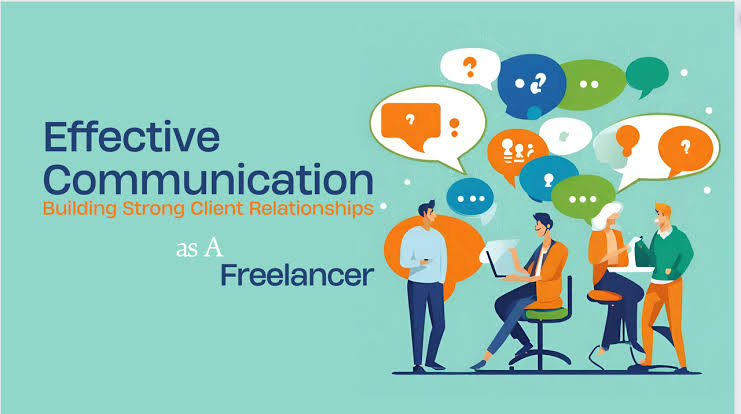Discover essential strategies for effective communication as a freelancer. Learn how to manage client expectations, craft clear proposals, maintain professionalism, collaborate with teams, handle conflicts, and build long-term relationships to enhance your freelancing career.
In realm of freelancing effective communication is paramount to building successful relationships with clients and collaborating efficiently with teams. Unlike traditional employment where face-to-face interactions are frequent, freelancers often work remotely. This makes clear and purposeful communication even more crucial. This comprehensive guide explores strategies to enhance communication skills. It ensures you can navigate client relationships and team collaborations smoothly.
Understanding Client Expectations
One of first steps in effective communication is to understand and manage client expectations. Begin by establishing clear lines of communication from outset. During initial discussions take time to thoroughly understand client's needs, objectives and preferences. This involves asking pertinent questions. Also seek clarification on project details. Documenting these conversations in written format such as email or contract, can prevent misunderstandings. It serves as reference throughout project.
Setting clear milestones and deadlines is another essential aspect of managing client expectations. Communicate these milestones early. Make sure both parties agree on them. Regular updates on progress can help reassure clients that project is on track. They allow for adjustments if needed. Additionally be transparent about any challenges or delays you encounter. This builds trust and demonstrates professionalism
Crafting Clear and Concise Proposals
When working with clients ability to craft clear and concise proposals is crucial. A well-structured proposal outlines your understanding of project. It also sets tone for your working relationship. Your proposal should include detailed scope of work, timelines deliverables and payment terms. Avoid jargon. Ensure that your language is straightforward and easy to understand.
Incorporate brief summary of project goals and how you intend to achieve them. This helps clients see your vision. It ensures both parties are aligned. By addressing potential questions or concerns upfront, you minimize risk of miscommunication. You establish solid foundation for project.
Maintaining Professionalism in Written Communication
Written communication is primary mode of interaction for freelancers. This is especially true when working remotely. To maintain professionalism ensure that all written correspondence is clear, well-structured and free of errors. Use formal tone. Avoid overly casual language unless client prefers more relaxed approach. Always proofread your messages before sending them to ensure they convey intended message accurately.
Timeliness is also key aspect of professionalism. Respond to client inquiries and messages promptly. Even if it is just to acknowledge receipt indicate when you will provide detailed response. This demonstrates respect for client’s time. It fosters positive working relationship.
Facilitating Effective Team Collaboration
Freelancers often collaborate with other professionals such as designers developers, or marketing experts. Effective communication within team is crucial for successful project outcomes. Begin by establishing clear roles and responsibilities for each team member. This helps avoid overlaps. It ensures that everyone understands their contribution to project.
Regular check-ins and progress meetings are valuable for keeping team aligned. Use project management tools and communication platforms to facilitate these interactions. Tools like Slack Trello, or Asana can help in tracking progress sharing updates and discussing project-related issues in real time.
Encourage open communication within team. Create environment where team members feel comfortable sharing ideas, feedback and concerns. This collaborative approach can lead to innovative solutions and a more cohesive team dynamic.
Navigating Conflicts and Feedback
Conflicts and feedback are inevitable in any professional setting. As freelancer handling these situations with tact and professionalism is essential. When addressing conflicts, approach issue calmly. Seek to understand other party’s perspective. Focus on finding resolution rather than assigning blame.
When providing feedback be constructive and specific. Highlight what is working well and suggest improvements in way that is supportive and encouraging. Similarly, when receiving feedback remain open-minded. Use it as opportunity for growth. Engage in dialogue with client or team member to clarify any points and agree on actionable steps for improvement
Building Long-Term Relationships
Building long-term relationships with clients and team members is significant aspect of freelancing. To foster these relationships consistently deliver high-quality work. Exceed expectations whenever possible. Show appreciation for opportunity to work together. Express gratitude for feedback and collaboration.
Maintain regular communication even after project is completed. Send occasional updates or check-ins. This helps to stay on client’s radar. It can lead to repeat business and referrals. Satisfied clients are more likely to return for future projects or recommend you to others.
Effective communication strategies are integral to successful freelancing career. By understanding client expectations, crafting clear proposals and maintaining professionalism freelancers can enhance their working experience. Facilitating team collaboration and navigating conflicts also matter. Building long-term relationships further supports success. Implementing these strategies can help you stand out in competitive freelancing market. Build a reputation as reliable and skilled professional.
